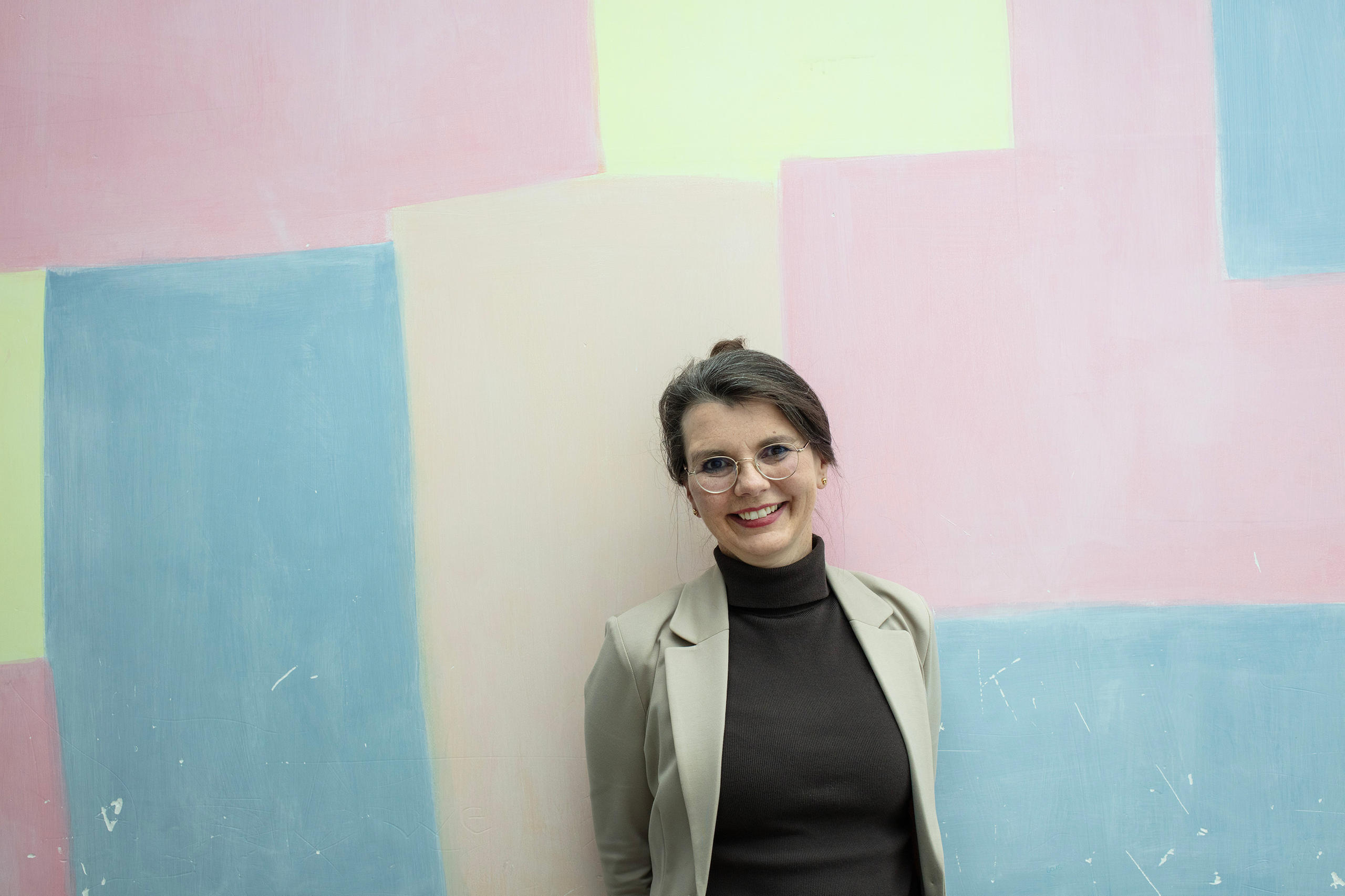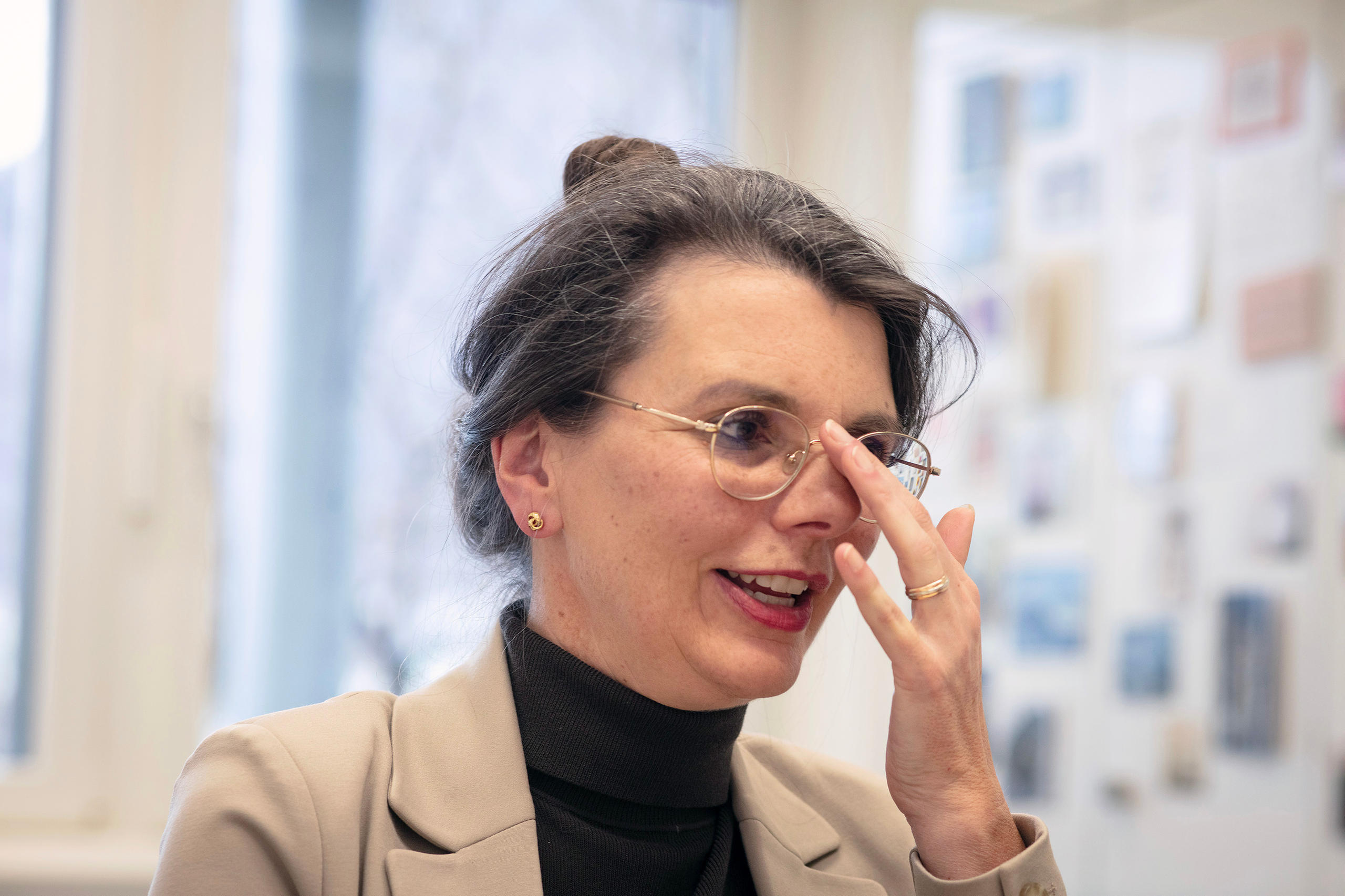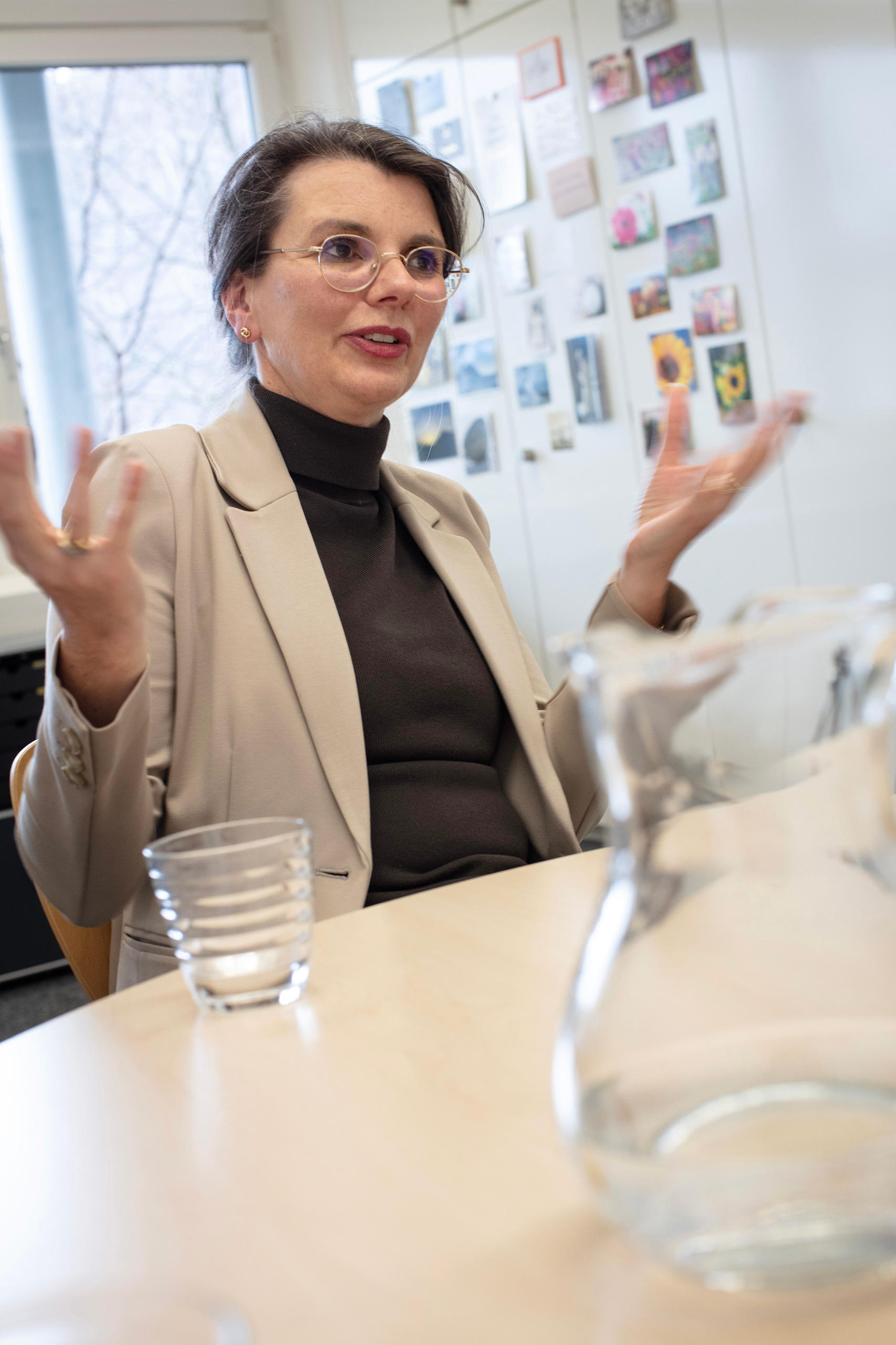Regina Durrer-Knobel: ‘Politics is always about the personal’

As a teacher, Regina Durrer-Knobel found there was nothing more boring than a well-behaved class. Last October, Durrer-Knobel became the first woman from canton Nidwalden in central Switzerland to be elected to the House of Representatives.
The students stream out of the underground car park into the school building. In rural Nidwalden, the young people of the cantonal capital, Stans, travel to the local vocational school by car.
Until she was elected to parliament last autumn, Regina Durrer-Knobel, the deputy head of the school, taught business studies here. Even aspects of accounting were a subject of lively debate for some of her students.
Debate as a source of energy
“There’s nothing more boring than an obedient class,” she says. “It’s very tedious to teach.” The work is interesting when a class questions the school rules, she says. Debate is also a source of energy in politics for the new member of parliament from the conservative Centre Party.
“Whenever I come out of a meeting with three to seven people where there has been some heated debate between the participants, I feel great. It doesn’t matter whether I got my arguments through or not.”
In the cantonal parliament, Durrer-Knobel led the finance committee, but in the national parliament, she is focussing on education policy and sits on the science, education and culture committee.
Last October, Swiss voters chose 56 new representatives to join the federal parliament in Bern. The Swiss People’s Party, the Centre Party, and the Social Democrats made the biggest gains in the 2023 election and sent the greatest number of new faces to parliament. The Green Party, on the other hand, suffered heavy losses and sent no new representatives to Bern.
In this series SWI swissinfo.ch profiles some of these new parliamentarians as they take their first steps in federal politics.
Committee work is Durrer-Knobel’s favourite part of politics. Everyone is prepared. Real discussions are possible. She can understand other attitudes and sympathises with political opponents, both on the right and the left.

“In Switzerland, polarisation is made out to be much more extreme than it is in reality,” she says. Then she pauses for a moment. “Of course, I’m in the centre myself and speak from the comfortable position of understanding every side.” She does this several times: putting forward a thesis and then immediately relativising it.
Family in the US
Durrer-Knobel is sure her relatives in the United States, who followed her electoral campaign closely, feel the polarisation more keenly than she does in Switzerland. Whether someone lives in the city or in the countryside, on Lake Geneva or in central Switzerland, “everyone can still talk to each other,” she says. This is also due to the fact that – unlike in the US – there is a diversity of parties.
Durrer-Knobel, who lives in a community of 2,000 inhabitants nestled between the mountains and Lake Lucerne, has a personal connection with the Swiss diaspora – partly because her sister lived abroad for several years.
Many people from central Switzerland once emigrated to the US, including a branch of Durrer-Knobel’s family three generations ago. They visit each other and the children come during vacations to practise the local language. Her American relatives no longer have Swiss passports, but they are still proud that someone in their family “sits in the equivalent of the US House of Representatives”, she says.
She understands the frustration of many Swiss Abroad about the lack of e-voting. “We do so much digitally,” says the parliamentarian. “Even in Switzerland, the printed envelope is slowly becoming an alien thing.” However, data protection must first be “watertight,” she adds. “The damage caused by a loss of trust in the event of suspected manipulation through e-voting would be irreparable.”
Women in the workforce
She sees Nidwalden as a “Switzerland in miniature”: a region that manages the “balancing act between tradition and innovation,” she says. “I see it as a relatively open canton where you can feel a sense of unity.”
Nidwalden was alone among the oldest Swiss cantons to vote in favour of women’s suffrage in 1971. On a local level, it was introduced there a year earlier. Durrer-Knobel, who was born that year, is now the first woman to represent Nidwalden in the lower chamber of parliament, even though the canton sent its first female senator to the federal parliament a quarter of a century ago.
For a long time, Durrer-Knobel did not believe that positive discrimination towards women was still needed in politics. “Today I definitely see it differently,” she says. If you ask a man whether he will take office, he questions how much time it would take up, she says. But if you ask a woman, she often asks whether she has the skills for it.
One specific area of women’s advancement that Durrer-Knobel is working on in the parliamentary education committee is how to support professional reintegration after a break to have children. “For example, we are looking at scholarships for middle-aged people to help cover living costs during further training,” she says.
In general, Durrer-Knobel would like to motivate companies to offer more attractive part-time positions. Almost all management jobs could also be shared by two people working on a part-time basis, she says.
This would allow more freedom in deciding how family work and employment should be divided up. “Of course women can stay at home, but there should also be more options in all sectors if each partner in a relationship wants to work 60%.”
She thinks little of those who bemoan a society that is becoming lazier. “There were lazy people around 100 years ago. There will never be a time when everyone is 100% active – and society can manage that.”
Low taxes in Nidwalden
Nidwalden has the lowest corporate taxes in the world. The canton relies on a low-tax strategy to attract businesses and the rich. This is familiar territory for Durrer-Knobel, a politician who specialises in finance. “It’s definitely worth it for us,” she says, “but we also pay millions in financial equalisation to other cantons, which is why it’s worth it for Switzerland as a whole.”

In her view, however, tax competition reaches its limits when people oppose every tax increase, no matter how small, for ideological reasons: “When it comes to
making savings in education, I say: let’s put taxes up!”
The seating arrangement in the federal parliament is different from that in the cantonal parliament: in Nidwalden, parliamentarians don’t sit with colleagues from their own camp, but with representatives from the same geographical region, according to their municipality of residence. This characterises the political culture.
“She knows what she wants, but she is even more conscious of what is important,” says her former seat neighbour, the Green Party member Thomas Wallimann-Sasaki. He says she voiced independent views and set her own priorities as chair of the finance committee. Does she lean to the left? “In my eyes, she is one of the more ‘left-wing’ members of the Centre,” he says. “She shows understanding for the socially disadvantaged.”
It is an open secret in Nidwalden that Durrer-Knobel won in part thanks to votes from parties on the left and in the green camp. While the right-wing Swiss People’s Party and the centre-right Radical Party put up their own candidates, the left backed the Centre politician.
Wallimann-Sasaki has nothing but praise for Durrer-Knobel. His only “fear” is that she will be “Centred” in the federal parliament by stricter party discipline.
Durrer-Knobel herself does not consider her new parliamentary group in Bern to be that strict. “The Centre has the lowest level of parliamentary group loyalty. That’s appealing,” she says. A little “lateral thinking” is always a good thing, in her view.
But politics at the federal level functions differently from what she experienced in her municipality and in Nidwalden. In the House of Representatives, there is so much business to deal with that parliamentarians don’t have the chance to immerse themselves in every single issue. When in doubt, they follow their parliamentary group. She cites this as the biggest change for her – alongside the lack of personal connections.
‘Politics is always about the personal’
“In the end, politics is always about the personal,” Durrer-Knobel says. When she talks to someone from Nidwalden, she has a connection after three sentences – because their daughters were girl guides together or their cousins were on holiday together, she says. “In Bern, I have no such connections with any of the 200 members of parliament. That makes the start more difficult.”
But she is not the first in her family to make this transition. Her great-great-grandfather was involved in federal politics: he became the first member of the Senate from Nidwalden after the founding of the Swiss federal state.
Edited by David Eugster. Adapted from German by Catherine Hickley/gw

In compliance with the JTI standards
More: SWI swissinfo.ch certified by the Journalism Trust Initiative










You can find an overview of ongoing debates with our journalists here . Please join us!
If you want to start a conversation about a topic raised in this article or want to report factual errors, email us at english@swissinfo.ch.